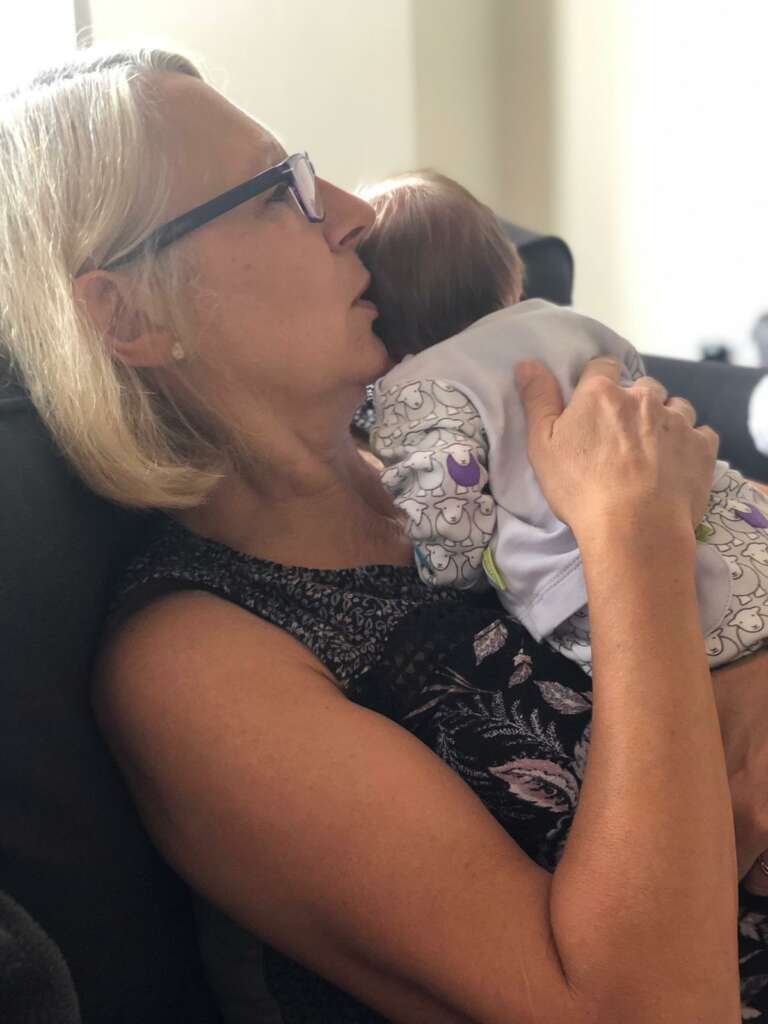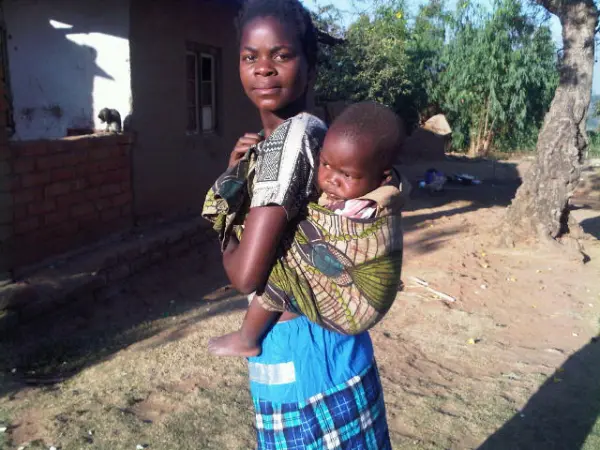Holding and carrying your baby all day is just what every woman does here. It isn’t a choice, it’s a necessity, but one which seems to work very well for both the woman and the baby. In the UK we have many options including prams and buggies, car seats, and a wide array of slings and baby carriers. In Malawi, every child is carried in the same way, wrapped in the ubiquitous chitenge.
One of the first things that struck me in my first days in Malawi was how calm babies and small children seem to be here. At an under 5s clinic, with over a hundred babies present, it is unusual to hear one cry for more than a moment or two. The postnatal ward, even when full to overflowing, with more mothers and babies than beds, is quiet. The influencing factor seems to be that the babies are held and carried, and sleep alongside their mothers. The postnatal ward has no cots. Those only exist in the special care nursery and are rarely used, other than to examine a baby. I will write a post about safe sleep in a few weeks.
In the UK there has been a powerful message given to parents for several generations that you shouldn’t always be holding and carrying your baby. It is often said that you “need” to put your baby down. Why? My grandmother, even when in her 90s, spoke sadly and with tears in her eyes about the way she treated her babies because she was told it was “best”. She fed on a strict four hourly routine, and then during the baby was placed in their pram. She was told that picking up a crying baby would spoil them. To cope with the frequent and pitiful crying, she would often move the pram to the end of their (rather long) garden, close the windows so that she couldn’t hear them – and then cry herself. Even through the concept of “demand feeding” has become fairly well established, the idea of “demand holding” is not common in the industrialised world. Psychology tells us that babies who experience being held most of the time tend to be calmer https://www.bellybelly.com.au/baby/cuddling-babies-smarter-calmer-secure/
Skin to skin contact helps to develop your baby’s protective skin biome, drawing protective microbes from you, specific to your environment, which protect against illness. This is particularly important if your baby has been born by c section and hasn’t come in contact with vaginal fluids. I wrote about other major benefits of skin to skin contact in my earlier post about kangaroo care https://yourmidwife.org.uk/blog/kangaroo-care-for-premature-babies/ Holding and carrying your baby most of the time in the early days will mean that you notice the early signs that baby is interested in feeding. As I often remind my clients, babies cannot tell the time! Just like us, sometimes they will feel like having an extra snack soon after a good meal, other days you (and they) may just fancy snacking all day. In Malawi, babies are breast fed on & off all day, often only sucking for a minute or two, but being absolutely content. As well as offering full packages of care I often visit new families once, or a few times, to help them work out the parenting style that is right for them https://yourmidwife.org.uk/antenatal-postnatal-care/
Carrying your baby in your arms obviously limits what you can do. This can be a distinct advantage in the early days after birth, but we are often not very good at just sitting and being. Our industrialised society celebrates busy-ness and tangible achievement. In Malawi, women sit for hours with their babies in their arms, with no mobile phone, TV or computer for distraction.
Very often I visit parents in the early days of family life and they apologise that they are not getting anything done and their home isn’t tidy. We need to recognise and celebrate the fourth trimester, the early weeks after your baby is born, as you all adjust. Taking the time to simply be close to your baby, to hold and become familiar with every little feature and expression is priceless. You are not wasting time. This is the greatest responsibility, building a deep connection with your baby. If you have been pregnant and given birth your body has a great deal of reorganisation to do. As a non birthing parent (biological or not), you are playing catch up with understanding the reality of this little life that you now have responsibility for. Grandparents and others who are special in the life of your family can also share in time holding and carrying your baby, but be sure that this is at a time and for a duration that feels right for you. It is easy to fall into the trap of allowing visitors to hold your baby while you make refreshments or tidy up. The people who really matter will understand if you keep hold of your baby and ask them to tidy the kitchen for you! If you need sleep, it often works well to let someone else carry and walk with your baby. I walked many miles with my grandchildren whilst their parents slept. Human babies are very underdeveloped compared to most mammals and there is a strong drive for babies to keep protective adults close. Holding and carrying your baby avoids them experiencing the stress of being alone.

Baby wearing, as I am seeing in Malawi https://www.carryingmatters.co.uk/secure-attachment-fourth-trimester/ meets the need for close physical contact whilst freeing your hands to do things. It is our privilege in the UK to have a wide range of options for baby carrying/ baby wearing. A great place to start can be an expert service such as the wonderful Lysanne at https://www.motherrucker.co.uk/. You can find other experts here https://www.carryingmatters.co.uk/sling-pages/.


1 Comment
I love this. I breastfed, co-slept and carried my baby from day 1. She never, ever cried, not until she was much older and her wants and needs had got more complex. If she was hungry or needed assurance that I was there, she reached for my breast and it was there. No crying involved. She still sleeps in my arms aged 2.